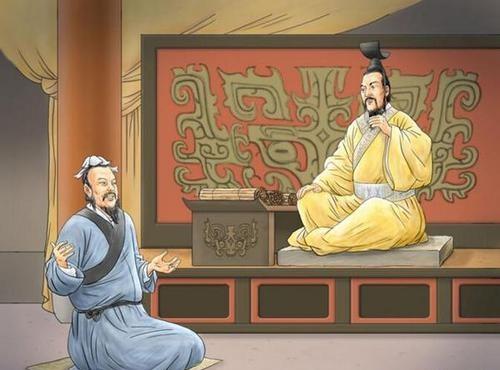Confucius had a relatively high evaluation of Yan Bao. In the Analects, it is said: "Yan Ping Zhongshan befriends people and respects them for a long time." "Yanzi" is the surname of "Son", the "Yan" surname, the name "Baby", the word "Zhong", and "Ping" are his posthumous nicknames. Confucius meant that Yan Zi, a person who had interacted with people for a long time, would remain respectful and respectful. This evaluation is the opposite of what the Analects says about the small people who are close and not inferior, and who are far away and complain. In other words, Yanzi was a gentleman recognized by Confucius. It is very difficult to stay with people for a long time and maintain a measured measure and treat each other with courtesy.

However, from the perspective of "Yanzi Spring and Autumn", it is obvious that Yan Bao's attitude towards Confucius is not so friendly.
Earlier, it was mentioned that Qi Jinggong said that he was old and did not have the energy to appoint Confucius to implement his ideas in the State of Qi, which is the saying in the Analects. If you look at it from "Yanzi Spring and Autumn", there may be other hidden feelings. When Confucius came to the State of Qi, Qi Jinggong wanted to reward Confucius and leave Confucius in the State of Qi, but Yan Bao explicitly disagreed.
Yan Bao thought that Confucius was proud and could not educate his students well. Indulge the people, and let him rule the people. The pursuit of external things such as clothing and grooming cannot guide and teach the people from the inner morality, and the liturgical music advocated makes the world extravagant and the behavior of the people more frivolous. Yan Bao believed that although Confucius was erudite, he could not set an example for the world, and he worked hard to help the people. People can't learn his doctrine for two lifetimes, can't figure out his so-called "rituals" for half a lifetime, and can't afford to save up for the liturgical pleasures he advocates. Therefore, Confucius only used red tape to whitewash heresies to confuse the monarch, which of course could not stabilize the people of the State of Qi and change the world style of the State of Qi.
Jing Gong thought that Yan Bao said it very well, so he treated Confucius with kindness and did not reward him, nor did he listen to Confucius's way of governing the country. In this way, Confucius certainly could not stay in the state of Qi, so he had to leave.
Yan Zi should be very disgusted with Confucian theoretical views and behavior, and completely opposed to Confucian filial piety and etiquette. Once Qi Jinggong heard a cry outside at the "road bed". The "road bed" is equivalent to the main hall, a dungeon room dedicated to official business. The person who wept was a disciple of Confucius, Shu Yu, who wept because his mother was dead. Someone who knew told Qi Jinggong that as a Confucian disciple, he was very proficient in the ritual music ceremony and the funeral dress system. His mother was buried thickly when she died, and then kept the funeral for three years, and he cried bitterly. Qi Jinggong listened very much in appreciation of The Language's behavior. Yan Zi was extremely unimpressed.
Yan Bao felt that the ancient saints were not unaware of these rules and rituals, but they did not use them to teach the people, because they felt that these tedious rituals were very annoying and time-consuming things for the living, but the dead did not know. Confucian etiquette is unhelpful to the dead and seriously endangers the living, which is a failed government that should be banned, not advocated.
This passage in "Yanzi Spring and Autumn" does not sound like it is true. If the cries of the weeping mother of the Fengyu language can be heard by Qi Jinggong in the palace room, it is unless the distance is particularly close. If the distance is so close that cries can be heard, will Confucius not ban the language? Confucius paid great attention to being measured properly on any occasion, and what attitude he used towards people of what status, how could he let The Language of Heaven cry outside the gonglu bedchamber without leaving it alone?
Besides, Fengyu's mother has been dead for three years, will Fengyu cry so bitterly? Confucian funeral rites do not make people express their grief like crazy, the reason why they are "rituals" is to be restrained. Loved ones have just passed away, crying all the time, and choosing no time. After 100 days, the "Sacrifice of Weeping" is held, which becomes a crying of time, that is, you can cry twice a day, once at night and once at night. After three years, the whole funeral was over, and I couldn't cry at any time when I thought about it.
"The use of etiquette, and the value of the price", Confucianism pays attention to etiquette is appropriate, what cares about is the heart, not only the ceremony, nor is it as cumbersome as possible. Confucians also do not pay attention to thick burials, but only pay attention to funerals that conform to their own identity.
<h1 class="pgc-h-arrow-right" > Author: Yuanji, cultural scholar, historical writer</h1>
Major works: "Legend of the Dragon and Phoenix", "The Hegemony of the Three Kingdoms in the Chaotic World of the North and the South", "Gao ChengChuan", "Love Detective Tailing", "Twenty-seven Years of Yin Chan", "Lost in ancient China" series in ancient China, "Interpretation of Chinese Characters in Museum Bronze Names" series, "Chinese Characters" Glyph Interpretation, "History of western Zhou in Bronze Inscriptions", "Jin Kingdom Hegemony", "Dream Back to Spring and Autumn", etc.